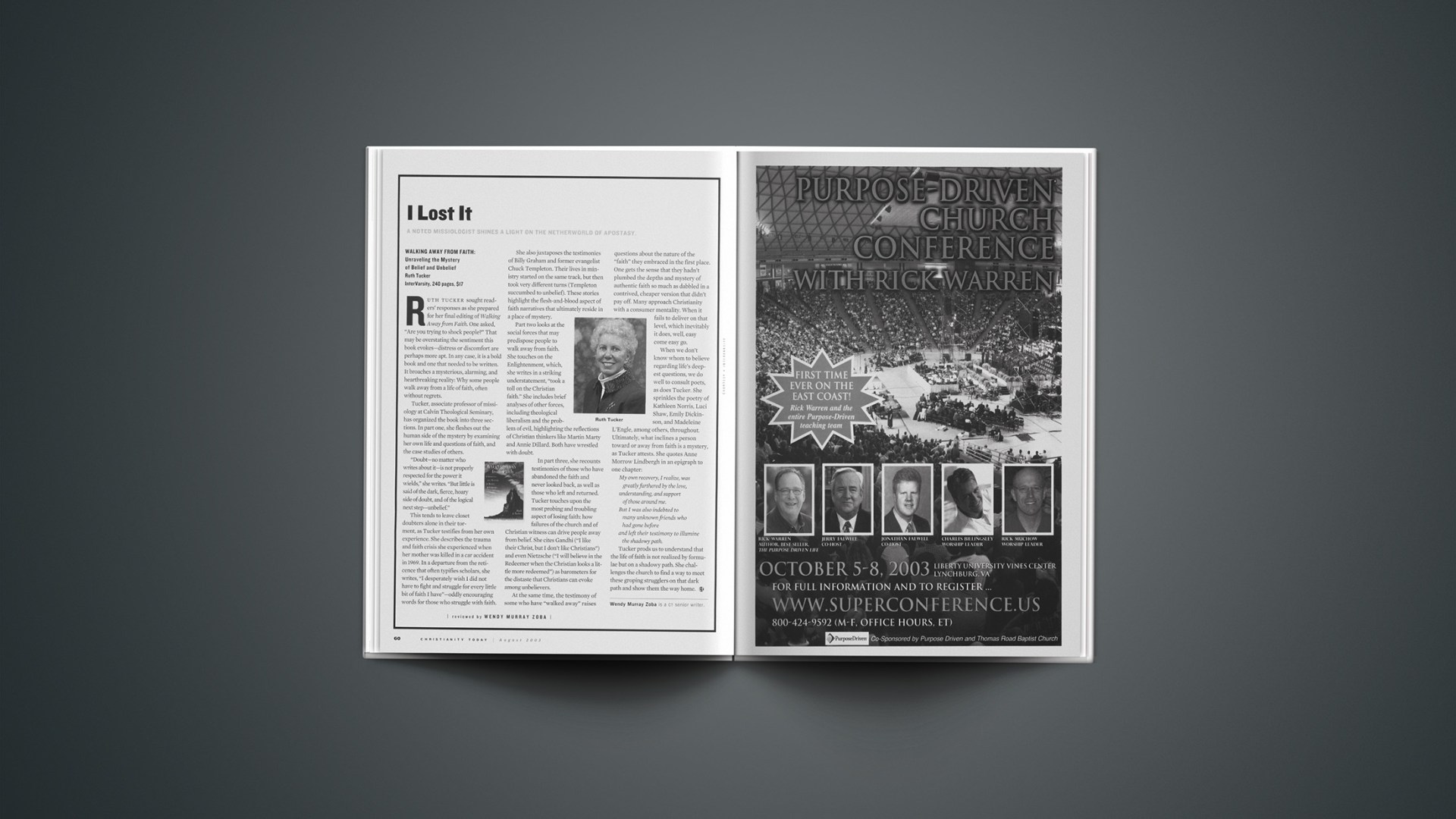Walking Away from Faith: Unraveling the Mystery of Belief and Unbelief Ruth Tucker InterVarsity, 240 pages, $17
Ruth tucker sought readers’ responses as she prepared for her final editing of Walking Away from Faith. One asked, “Are you trying to shock people?” That may be overstating the sentiment this book evokes—distress or discomfort are perhaps more apt. In any case, it is a bold book and one that needed to be written. It broaches a mysterious, alarming, and heartbreaking reality: Why some people walk away from a life of faith, often without regrets.
Tucker, associate professor of missiology at Calvin Theological Seminary, has organized the book into three sections. In part one, she fleshes out the human side of the mystery by examining her own life and questions of faith, and the case studies of others.
“Doubt—no matter who writes about it—is not properly respected for the power it wields,” she writes. “But little is said of the dark, fierce, hoary side of doubt, and of the logical next step—unbelief.”
This tends to leave closet doubters alone in their torment, as Tucker testifies from her own experience. She describes the trauma and faith crisis she experienced when her mother was killed in a car accident in 1969. In a departure from the reticence that often typifies scholars, she writes, “I desperately wish I did not have to fight and struggle for every little bit of faith I have”—oddly encouraging words for those who struggle with faith.
She also juxtaposes the testimonies of Billy Graham and former evangelist Chuck Templeton. Their lives in ministry started on the same track, but then took very different turns (Templeton succumbed to unbelief). These stories highlight the flesh-and-blood aspect of faith narratives that ultimately reside in a place of mystery.
Part two looks at the social forces that may predispose people to walk away from faith. She touches on the Enlightenment, which, she writes in a striking understatement, “took a toll on the Christian faith.” She includes brief analyses of other forces, including theological liberalism and the problem of evil, highlighting the reflections of Christian thinkers like Martin Marty and Annie Dillard. Both have wrestled with doubt.
In part three, she recounts testimonies of those who have abandoned the faith and never looked back, as well as those who left and returned. Tucker touches upon the most probing and troubling aspect of losing faith: how failures of the church and of Christian witness can drive people away from belief. She cites Gandhi (“I like their Christ, but I don’t like Christians”) and even Nietzsche (“I will believe in the Redeemer when the Christian looks a little more redeemed”) as barometers for the distaste that Christians can evoke among unbelievers.
At the same time, the testimony of some who have “walked away” raises questions about the nature of the “faith” they embraced in the first place. One gets the sense that they hadn’t plumbed the depths and mystery of authentic faith so much as dabbled in a contrived, cheaper version that didn’t pay off. Many approach Christianity with a consumer mentality. When it fails to deliver on that level, which inevitably it does, well, easy come easy go.
When we don’t know whom to believe regarding life’s deepest questions, we do well to consult poets, as does Tucker. She sprinkles the poetry of Kathleen Norris, Luci Shaw, Emily Dickinson, and Madeleine L’Engle, among others, throughout. Ultimately, what inclines a person toward or away from faith is a mystery, as Tucker attests. She quotes Anne Morrow Lindbergh in an epigraph to one chapter:
My own recovery, I realize, was greatly furthered by the love,
understanding, and support of those around me.
But I was also indebted to many unknown friends who had gone before
and left their testimony to illumine the shadowy path.
Tucker prods us to understand that the life of faith is not realized by formulae but on a shadowy path. She challenges the church to find a way to meet these groping strugglers on that dark path and show them the way home.
Wendy Murray Zoba is a CT senior writer.
Copyright © 2003 Christianity Today. Click for reprint information.
Related Elsewhere
Walking Away from Faith is available at Christianbook.com and other retailers.
Last year, Dick Staub interviewed Ruth Tucker about Walking Away from Faith and doubting God.
Christianity Today‘s sister publication Books & CulturereviewedWalking Away from Faith in 2002.
Ruth Tucker’s website QuestioningFaith.com hosts candid conversations about religion.










